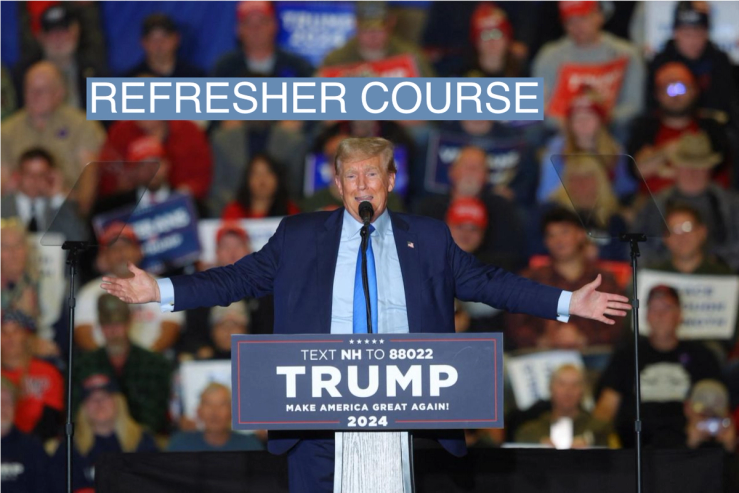The News
President Biden is returning to a message that’s worked for Democrats in races around the country since his election, portraying Donald Trump as a threat to American democracy who would use his perch to punish political enemies and reward fringe supporters.
The attacks have ramped up to a new level in recent days, particularly after Trump described his political enemies as “vermin” over the weekend. President Biden described Trump’s remarks as “language you heard in Nazi Germany in the ’30s” at a fundraiser on Tuesday after the White House issued a similar statement earlier in the week, pointing to news reports linking his rhetoric to Hitler and Mussolini. Democrats noted the president’s personal involvement as a sign of a more confrontational phase after several months largely focused on positive messaging around his “Bidenomics” agenda.
The campaign has also been publicly pushing the press to more extensively discuss reports detailing potential plans to use the federal government against enemies, implement sweeping immigration crackdowns, and more. A series of press releases warn about “Trump’s America in 2025,” accusing the former president of being “hell-bent on undermining our democratic institutions” while warning that “a national abortion ban is on the ballot in 2024″ (which Trump has so far not endorsed).
A Biden campaign official told Semafor that their team planned to highlight under-the-radar policy planks proposed by Trump and his team “every day between now and Thanksgiving.”
“What we see is a failure to properly cover Donald Trump’s dangerous agenda,” the campaign official said. “I think we are filling that void.”
The new attention presents a significant challenge for Trump, who has largely been focused on winning over Republican primary voters since leaving office. In the midterms, Republican candidates aligned with Trump suffered loss after loss in battleground states as Democrats warned that they would pursue a conspiracy-laden agenda and threaten free and fair elections after Jan. 6. A key turning point was the party’s decision, backed up by high-profile speeches from Biden, to label their opponents “MAGA Republicans” in the final stretch — directly tying them to Trump, and tying newly legal abortion bans to his movement.
Democrats credited that message with convincing swing voters to overlook their frustration with Biden and the economy and pull the lever for their candidates. Whether Trump can find a way to neutralize or overpower the same attacks could potentially be the single biggest determinant as to whether he succeeds in returning the White House.
“The general election has begun,” Democratic strategist Simon Rosenberg told Semafor. “It’s time now for the campaign to turn on, to adopt a general election posture, and to not only make their case, but to engage Trump more aggressively — which they’re now doing, and which I think is going to be effective and important.”
Privately, Trump aides admit that having their candidate’s name in the same sentence as Hitler and Mussolini this week isn’t a positive. But they also see some upside as well: More media attention amplifies his attacks — one Trump advisor said seeing “vermin” next to Democrats in cable news chyrons was an “effective message” — and provides an opportunity to rally supporters by accusing the press of playing up the outrage. The campaign’s initial response also seemed to play up the dictator angle as a troll, with spokesman Steven Cheung telling the Washington Post their critics “are suffering from Trump Derangement Syndrome and their entire existence will be crushed when President Trump returns to the White House.”
Of course, as every team that’s worked with Trump knows, they also have little choice but to build around the candidate’s message — he’s the primary driver of his campaign and has historically pushed back against efforts by aides to restrain his speech. In the case of his “vermin” riff on Veterans Day, Semafor was told it was not written into his remarks. The comment during his speech closely mirrored a message on Truth Social, where he often writes his own posts.
But the Trump campaign is noticeably trying to exercise more discipline over the parts of the campaign they can control as the general election nears. That includes cracking down on the sprawling network of groups, politicians, and acquaintances associated with Trump and who have been sources for stories about his potential second administration ever since he left office. The campaign’s top two advisors, Susie Wiles and Chris LaCivita, put out a lengthy statement this week distancing themselves from outside efforts to plan a transition and policy platform, declaring that “none of these groups or individuals speak for President Trump or his campaign.”
In this article:
Shelby’s view
On the surface, nothing about this is new. Trump says inflammatory things about his opponents, Democrats warn Republicans are extremists and that “democracy is on the ballot” — it’s all recognizable behavior dating back to 2015.
But this week has marked a shift towards a general election environment, and we’re starting to see some of the implications. Things Trump says are now treated as newsworthy in a way they weren’t before he officially announced his presidential run last year (and before it became clear he was the overwhelmingly likely nominee this year), and the Biden campaign is trying to make that distinction clear. Democrats highlighting the “vermin” remark helped give it sustained media scrutiny over several days in ways that likely would not have happened a year ago. Expect to see a lot more working the refs from both sides moving forward, albeit with different complaints.
The framing of the race is also different. Up until now, both Republican candidates and coverage of their campaigns have been focused most on the Republican voters they’ll face in the primaries. As that shifts, the views of swing voters — like the famed “double haters” who dislike both Biden and Trump — are going to take up more and more attention.
Ultimately, this very news cycle showcases the big test for both candidates. Can Trump make the election a referendum on Biden’s policies on issues like the economy and immigration, where polls show voters trust Republicans more? Or can Biden make the election a choice between conventional American politics and what he argues is an unacceptably dangerous alternative?
Room for Disagreement
Trump’s Republican opponents aren’t ready to move onto the general election just yet. Candidates are betting he has a weak spot in Iowa, where voters often make up their minds late and outside groups see signs of softness in his support.
Notable
A new poll from Quinnipiac University finds that 21% of Americans identify “preserving democracy” as their most important election issue from a list of ten, trailing only the economy as the top choice.


